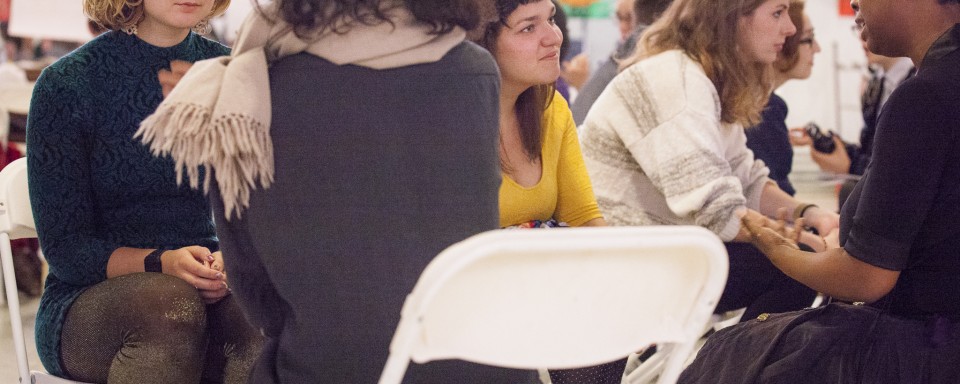by Brittany Wright
Students of the Working Class Public History class reflected on their experiences of representing oral histories of Pointe-Saint-Charles which are part of the archive at the Centre for Oral History and Digital Storytelling.
When I began this project with the help of the Neighbourhood Theatre students, I was nervous. I am not much of an actress, and it had been years since I played make-believe. “Would I be any good at this?” was a question that constantly ran through my mind. “If I’m not, will my blunders effect my portrayal of a real-life human being whom I am supposed to represent?”
With the doubts in mind, I watched the oral history interview with Joe Mell, a Pointe Saint-Charles native and active member of the community. I paid strict attention to the details of his mannerism, the slight Irish accent he spoke with, the way he fiddled with a pen while he responded to Professor Steven High’s questions. While I laughed at his funny stories and sighed at his sadder anecdotes, I tried to decide how I was going to portray this remarkable man. I immediately decided I would not try to emulate his accent, as I am terrible at accents, but I wondered if I should play with a pen during our “speed dating” exercise. The same kind of doubts I had earlier ran through my mind: Would this come off as a mocking imitation, even if it was unintentional? How far can an actor go in portraying a person without devolving into stereotypes? I took my notes, memorized my facts, and mentally prepared myself, but my doubts were not completely unresolved.
In the end, I chose not to play with my pen. I was nervous enough, and concentrating on fiddling with the pen just like Mr. Mell did would only serve to distract me even more. I ended up telling the same stories to my “dates” over and over again because I found them to be the most interesting and the most pivotal in Mr. Mell’s life- namely, how the death of two older brothers influenced him to become both a rehabilitator and the head of a sports club known as Leo’s Boys. When I met other “dates” who were also portraying Mr. Mell, they focused on other aspects of his life, such as his time in the army. I started to wonder if I had done a disservice to my “character” by only focusing on a few aspects of his life. Should I have switched stories more? How many anecdotes and interconnected events could I fit into only ninety seconds of interview time?
In retrospect, I regret to say that I feel like my doubts held me back. I was so worried about portraying Joe Mell in a sensitive way that I did not do much to overtly emulate him. Perhaps I should have given the pen-fiddling a try. Or, maybe I should have dressed like him. Either way, this exercise has shown me that the line between accurately portraying someone and devolving into unintentional mockery is fuzzy, at best. Now, I believe the only way I could have felt comfortable imitating Mr. Mell in any way would be if I could have directly asked him what he found good and what he found offensive. These stories we have tried to tell this week are very personal, and I now understand how important it is to relay them in a sensitive way. It was certainly an interesting experience, and I’m hopeful that this new-found awareness of sensitivity will help me craft a better final report for my public history class. I will be investigating the Saint Charles Library, after all, and I think this exercise has helped me realize that it’s all right to use other peoples’ stories in my own work, as long as I do it in a reasonable, considerate way!
by Brittany Wright
